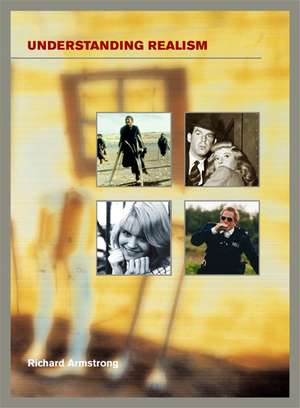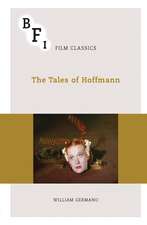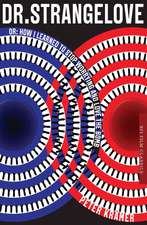Understanding Realism: Understanding the Moving Image
Autor BFI Author Record, Richard Armstrongen Limba Engleză Paperback – 14 ian 2005
Preț: 230.69 lei
Nou
Puncte Express: 346
Preț estimativ în valută:
44.15€ • 45.92$ • 36.45£
44.15€ • 45.92$ • 36.45£
Carte disponibilă
Livrare economică 25 martie-08 aprilie
Preluare comenzi: 021 569.72.76
Specificații
ISBN-13: 9781844570621
ISBN-10: 1844570622
Pagini: 141
Dimensiuni: 155 x 235 x 12 mm
Greutate: 0.34 kg
Ediția:2010
Editura: British Film Institute
Colecția British Film Institute
Seria Understanding the Moving Image
Locul publicării:London, United Kingdom
ISBN-10: 1844570622
Pagini: 141
Dimensiuni: 155 x 235 x 12 mm
Greutate: 0.34 kg
Ediția:2010
Editura: British Film Institute
Colecția British Film Institute
Seria Understanding the Moving Image
Locul publicării:London, United Kingdom
Notă biografică
Richard
Armstrong
is
a
freelance
film
writer
and
tutor
whose
work
has
appeared
in
Uncut,
Senseofcinema.com,
Bright
Lights
Film
Journal,
Tes/Thes,
In
the
Picture,
learning
Resources
Journal,
and
Film
Quarterly.
He
is
also
the
author
of
Billy
Wilder.
American
Film
Realist
(McFarland,
2000)
and
a
contributor
to
Contemporary
North
American
Film
Directors
and
Contemporary
British
and
Irish
Film
Directors
(Wallflower
Critical
Guides,
2000/2001).
Textul de pe ultima copertă
In
a
world,
in
which
camcorders
and
CCTV
are
witness
to
our
every
move
and
Big
Brother
and
The
Blair
Witch
Project
are
phenomenally
popular
and
widely
imitated,
the
divide
between
reality
and
liction
has
become
increasingly
blurred.
Understanding
Realism
aims
to
explain
and
make
accessible
a
concept
central
to
the
understanding
of
film
and
television
studies.
It
is
the
second
in
a
series
of
short
orientation
texts
geared
to
the
formal
study
of
the
moving
image.
Using
a
selection
of
the
critical
approaches,
Understanding
Realism
examines
the
complex
relationship
between
the
moving
image
and
appearance
and
reality.
Deploying
the
films
One
Fine
Day
and
Clerks
as
major
case
studies.
Richard
Armstrong's
indepth
treatment
considers
in
turn
the
roles
that
narrative,
genre,
audience
and
ideolgy
play
in
relation
to
realism
in
mainstream
Hollywood
and
US
independent
film.
He
also
discusses
how
it
is
possible
to
reconcile
the
Impression
that
what
is
being
watched
is
reality
with
the
knowledge
that
it
is
not.
This
introductory
book
written
by
an
experienced
film
studies
tutor,
provides
an
accessible
overview
of
a
concept
key
to
the
understanding
of
contemporary
media.















